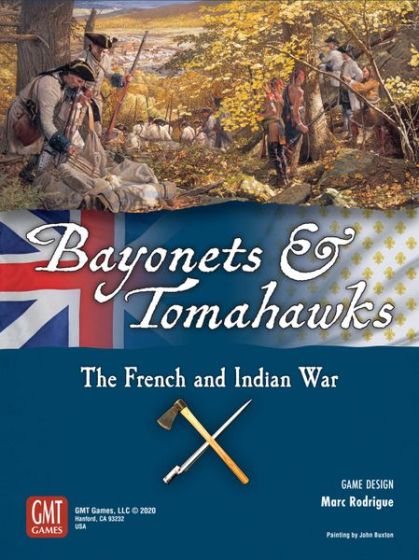Bayonets and Tomahawks
-
Players: 2
-
Age: 14+
-
Languages: English
A game of Bayonets & Tomahawks can last 1 or more game years depending on the scenario chosen — up to the full conflict. During each game year, there are 8 action rounds where players move their pieces on land and sea, perform raids, build forts and roads, etc. Battles/sieges usually occur at the end of each action round. A game year also includes 3 logistics rounds: “Fleets arrive”, “Colonials enlist” and “Winter quarters”.
Bayonets & Tomahawks is card-driven. But unlike most card assisted wargames player don't manage a hand of cards. Each player starts the year with one undisclosed reserve Action card picked randomly. At the beginning of each Action round, both players draw a new card. They must then choose one of their 2 cards to play for the current round. The other card becomes their reserve for the next round. At each action round, the French player also gets a random Indians action card.
The Action points (AP) on the cards in play determine how many stacks of pieces a player can activate during the current round. In addition the cards trigger events and determine initiative for the next Action round. Movement is point to point. Pieces can also move via sea zones.
Each side has particular assets he must make the most of in order to achieve victory. The British have overwhelming numbers, the French are more adept at wilderness fighting with the help of their numerous Indian allies. To win, a player must control enough enemy key spaces to reach the scenario’s Invasion victory points requirement by game end. In one-year scenarios, pieces removed permanently from play yield Invasion VP as well. The French player can also win if he succeeds in enough raids during the current year to reach the scenario’s Raid victory points requirement.
By its nature, the game lends itself to solitaire play. In bonus, the rules allow to split the actions of each camp methodically. This way, up to 2 British players (British, Colonial) and 3 French players (French, Canadien, Indian) can relive the historic pains of shared command.













